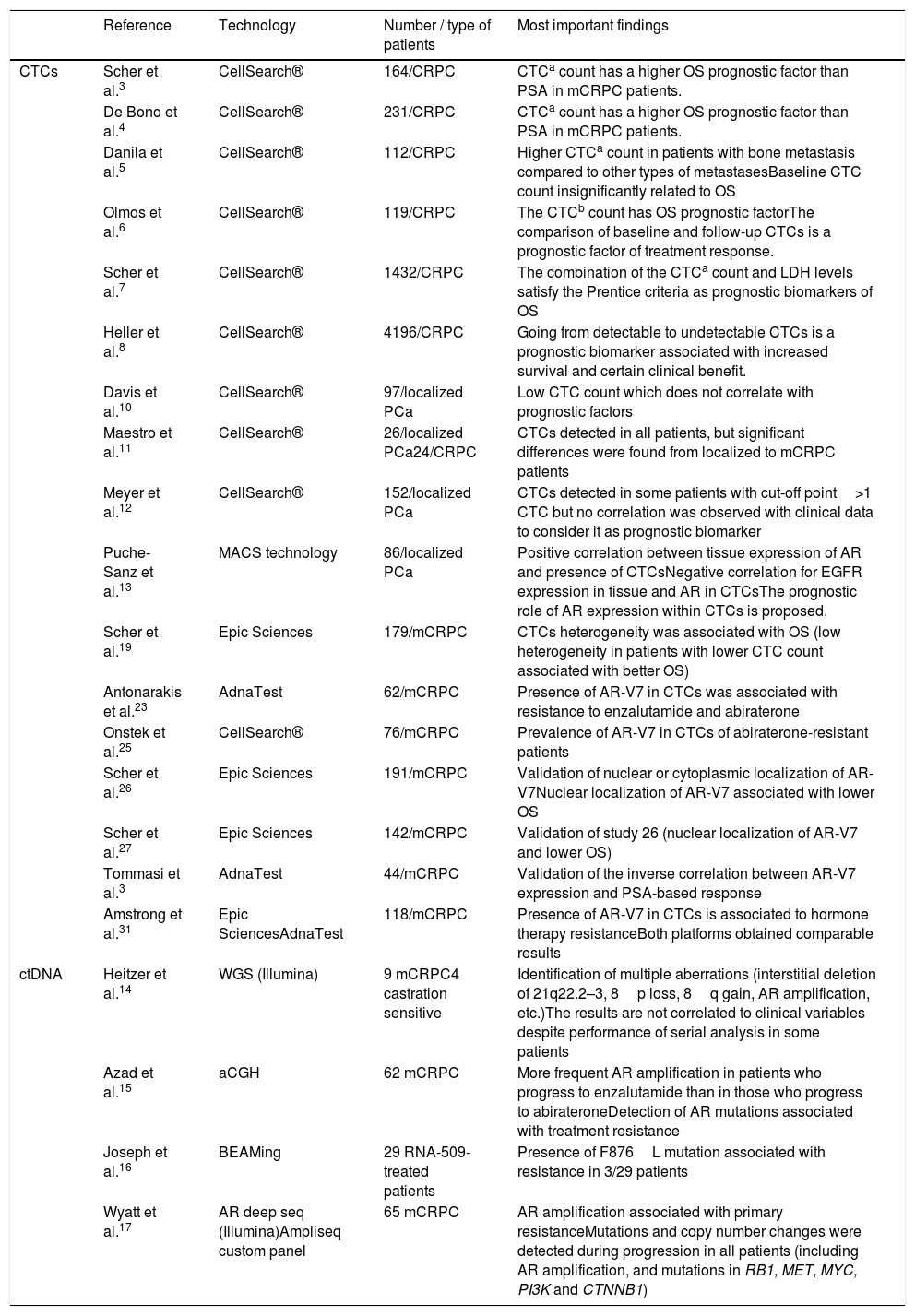Despite being a validated source of biomarkers, liquid biopsy has not yet succeeded in becoming part of the standard clinical practice in prostate cancer patients. Few biomarkers undergo adequate validation, prospective and independent, of their predictive and/or prognostic value, which results in a lack of the different available tests in the clinical practice.
ObjectiveTo carry out a pragmatic synthesis of current scientific evidence on liquid biopsy for prostate cancer patients.
Evidence acquisitionNon-systematic literature review, narrowing the search to papers on liquid biopsy from blood samples in prostate cancer patients. We mainly selected works evaluating clinical endpoints in prostate cancer.
Evidence synthesisThe most clinically advanced forms of liquid biopsy are circulating tumor cells (CTCs) and circulating tumor DNA (ctDNA). Both CTCs and ctDNA have demonstrated their prognostic value in metastatic disease. ARV7 determination is the first predictive biomarker of the disease. Its implementation into routine clinical practice requires methodological standardization and adequate clinical validation of the different available ways to detect it. The detection of CTCs in the early stages of the disease still depends on the optimization of the diagnostic methods and on the development of the biological characterization of these cells. The biological information provided by CTCs and ctDNA is different; therefore, the study of its adequate combination is the object of cutting-edge research.
ConclusionsThe absence of protocols and methodological standards is the limiting factor when aiming to reach conclusions that could have a potential impact on clinical practice. Therefore, the real short-term challenge for liquid biopsy is the establishment of consensus and common criteria.
Resumen
ContextoA pesar de ser una demostrada fuente de biomarcadores, la biopsia líquida aún no ha conseguido dar el paso a la práctica clínica habitual en pacientes con cáncer de próstata. Pocos biomarcadores se someten a una adecuada validación de su valor predictivo y/o pronóstico, prospectiva e independiente,; y ello resulta en una falta de traslación real a la clínica de los diferentes test disponibles.
ObjetivoRealizar una síntesis, clínicamente pragmática, de la evidencia científica actual sobre la biopsia líquida sanguínea en cáncer de próstata.
Adquisición de la evidenciarevisión no sistemática de la literatura acotando la búsqueda a trabajos sobre biopsia líquida de origen sanguíneo en cáncer de próstata. Se seleccionan preferentemente aquellos trabajos en los cuales se estudian end-points clínicos aplicados al cáncer de próstata.
Síntesis de la evidenciaLas formas de biopsia líquida más avanzadas en términos clínicos son las células tumorales circulantes (CTCs) y el ADN tumoral circulante (ctDNA). Tanto CTCs como ctDNA han demostrado su valor pronóstico en enfermedad metastásica. La determinación de ARV7 constituye el primer biomarcador predictivo de la enfermedad. Su traslación a la práctica clínica habitual pasa por la estandarización metodológica y la adecuada validación clínica de las distintas formas de detección disponibles. La detección de CTCs en estadios iniciales de la enfermedad depende aún de la optimización de los métodos de detección y del desarrollo de la caracterización biológica de estas células. La información biológica aportada por CTCs y ctDNA es distinta; por ello, el estudio de su adecuada conjunción es objeto de la investigación más actual.
ConclusionesLa ausencia de protocolos y estándares metodológicos es el factor limitante para llegar a conclusiones de impacto clínico. Por ello, el consenso y la unificación de criterios constituyen el verdadero desafío a corto plazo para la biopsia líquida.
Artículo
Comprando el artículo el PDF del mismo podrá ser descargado
Precio 19,34 €
Comprar ahora









